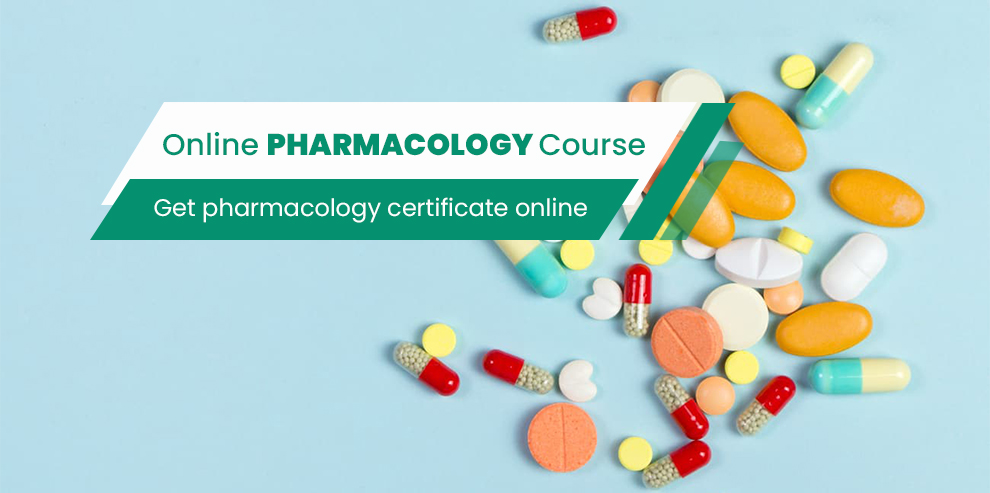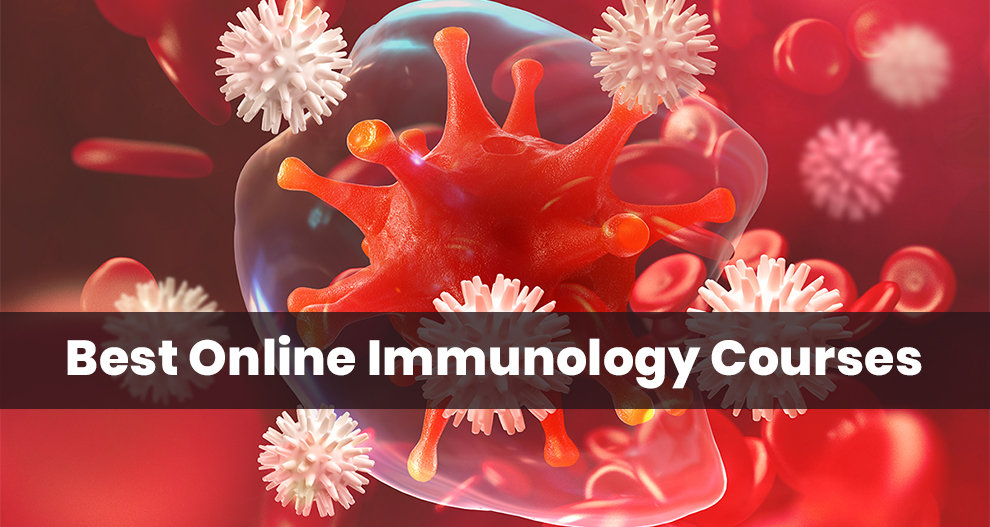Pharmacology is the study of drugs. To break it down for you, pharmacology refers to the impact of drugs on the human body and the body’s subsequent reaction when chemicals are induced or interact with it.
Typically, in pharmacology, you will study the drug sources, their resultant properties, and their impact on the body – psychological, emotional, or physical. Further, the drugs are not always meant for abuse. They are also employed for their therapeutic qualities, and the study of that, too, falls under this branch.
In addition to that, the absorption, administration, and selection of the drug are also three prime aspects. So, broadly speaking, the scope of pharmacology is vast. It is not something you will learn in a day, but it is definitely something that can be learned to master drugs.
The safest bet is to search for the best online pharmacology course and enroll in it. But, the problem arises when you have this wide variety of courses to choose from. So, how do you make your selection and pick the right online pharmacology classes for yourself?
We did all the hard work for you and studied through around 50 courses. From them, we carefully screened the courses and classified them as best by measuring them on four parameters:
- Ratings and reviews on the course.
- Offerings of the course – certification, resources, study material, etc.
- Experience of the instructor
- The fee that you pay for it
This screening left us with only 15 courses, which we presented to the top Pharmacology experts. They further examined the courses, and that is how we finally came up with the list of the seven online self paced pharmacology course given below.
Now, let us get started and understand what these courses will teach you.
Seven Best Online Pharmacology Courses
- Drug Development Product Management Specialization – [Coursera]
- Chemicals and Health – by Johns Hopkins University – [Coursera]
- Introduction to Pharmacology – by Doane University – [edX]
- HMX Pharmacology – by Harvard University [HMX]
- NBDE Pharmacology Mnemonics Online Course – Part 1 – [Udemy]
- Online pharmacology course – [Straighter Liner]
- Online Pharmacology Class – [Des Moines Area Community College]
7 Best Courses To Earn Pharmacology Certificate Online
1. Drug Development Product Management Specialization – [Coursera]
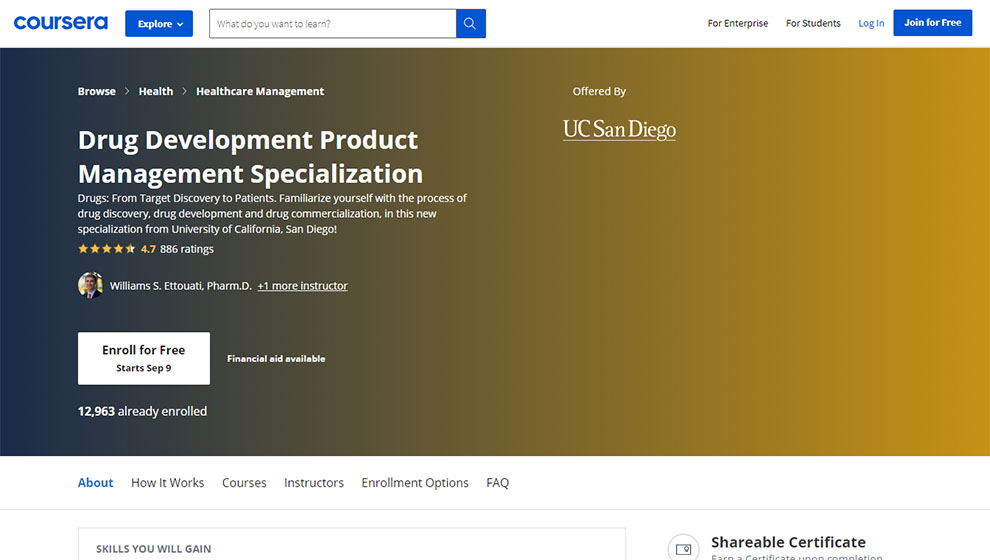
Biotech and pharmaceutical companies are putting in millions of dollars towards drug development and promising upcoming biologics with the desire and hope to save or elongate a patient’s life.
This specialization is aimed at just that. It will offer a 30,000 feet view of the whole process of drug development and discovery.
| Rating | 4.7 |
| Duration | 3 months |
| Certification | Yes |
| Instructor | Williams S. Ettouati and Joseph D. Ma |
| Paid/Free | Paid |
| Live/Recorded | Recorded |
| Return or Refund policy | 7 days trial, followed by a 14-days return policy |
| Level | Beginners |
| Cons | Some information seems outdated, use of some technical terms in between may confuse the absolute beginners. |
Learning Outcomes
This specialization is a compilation of three online pharmacology courses. Some essential learnings from these online pharmacology classes are addressed below.
- In course one, you will learn how the scientists go on their drug discovery journey to fill for the Initial New Drug application finally.
- Course two of the three-part course pack deals with an in-depth understanding of drug development from Phase 0 to 3 clinical trials, followed by learning to fill a new drug application.
- Lastly, the third part of this compilation will help you understand the intricacies of releasing new pharmaceutical products, patient access, and ensuring sales success.So, anyone interested in understanding the working of the US health industry will have a lot to like about thiscourse.
Once you are thorough with all threeonline pharmacology courses,you will have acquired an in-depth understanding of the process involved in drug discovery.
Also, after you have learned whatever there is to learn in these courses, you will be working on several hands-on projects. For acquiring a pharmacology certificate online,you will have to complete all the projects. You will have to finish all the courses in sequence, along with their projects, before you move to the next one.
Prerequisites, if any:
All the three online pharmacology courses included in this specialization are 100% online. So, you can start at your pace and take the course at your timeline.
Further, it is a beginner-level pharmacology online course for medical students. So, even amateurs and beginners will find this incredibly helpful. But, it is a long course. So, you need to put in at least three hours of work every week for 12 weeks for this course.
It is an English language course, but you can find the subtitles in English, Arabic, French, Portuguese (European), Italian, Vietnamese, German, Russian, and Spanish.
2. Chemicals and Health – Offered by Johns Hopkins University – [Coursera]
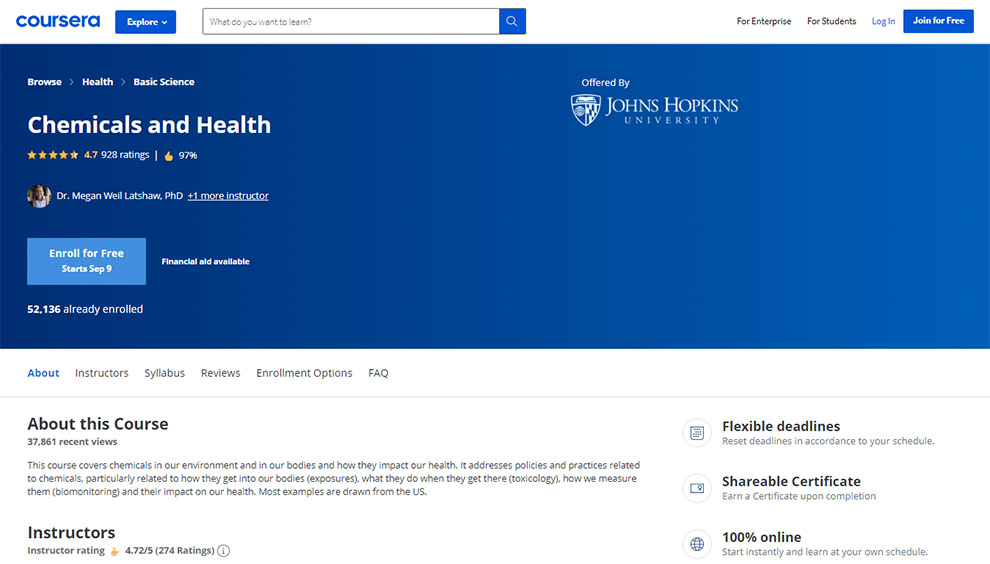
Need a well-compiled and comprehensive solution to your search for a ‘pharmacology course near me?’ If yes, then this one by Johns Hopkins can be a good pick. This is a 100% online self paced pharmacology course that you can take at your timeline and schedule.
Over 52000 students have availed themselves of this pharmacology certificate online course. If budget is the only reason that’s curtailing you from availing of this course, we have good news for you. You can find financial aid for this course.
| Rating | 4.7 |
| Duration | 11 hours |
| Certification | Yes |
| Instructor | Dr. Megan Weil Latshaw and Beth A. Resnick |
| Paid/Free | Paid |
| Live/Recorded | Recorded |
| Return or Refund policy | 7 days trial, followed by 14-days return policy |
| Level | Beginners |
| Cons | Content is good overall, the videos and the presentation seem off at times. |
Learning Outcomes
Theseonline pharmacology classes will teach you the following:
- Knowledge of the chemicals in the environment
- Learning about the different chemicals in our body
- The impact of different chemicals on our health
- Practices and policies associated with the chemicals, especially those associated with how they enter our body (via exposure or contraction)
- The impact the chemicals can leave on us when they enter our body.
- Measuring the chemicals and their impact on human health
Is it the right course for you?
Most examples in this course belong to the US environment. Therefore, students from the States will find this the right pick to their ‘best pharmacology course near me’ query.
In addition, anyone else interested in knowing the cause and impact of chemicals will also find these online pharmacology courses absolutely helpful.
Prerequisites, if any:
It is a beginner-level pharmacology online course for medical students. So, there are no prerequisites to take this course. But, the course is in the English language, and you can find Arabic, French, Portuguese (European), Italian, Vietnamese, German, Russian, English, and Spanish subtitles.
Sign Up Here
3. Introduction to Pharmacology – by Doane University – [edX]
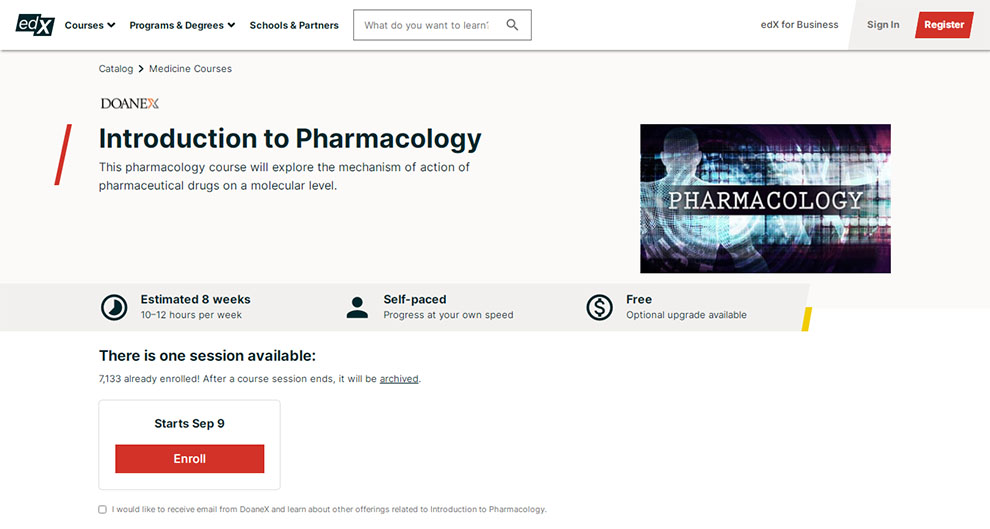
Ranked at number third on our list is the best online pharmacology course by edX. In this online self paced pharmacology course, you will study the mechanism of the action of pharmaceutical drugs at the molecular level.
It is a free course. However, if you require graded assignments and a pharmacology certificate online, you will have to bear a fee for it. Once you are through with this pharmacology course, you will have a working knowledge of pharmacokinetics, drug toxicity, therapeutics, and drug discovery.
| Rating | N/A |
| Duration | 8 weeks |
| Certification | Optional |
| Instructor | Steve St. Onge |
| Paid/Free | Optional |
| Live/Recorded | Recorded |
| Return or Refund policy | 14-days from your purchase date. |
| Level | Introductory |
| Cons | The free version of the course does not fetch you a certificate. Also, in the free version, there is only limited access to the resources. |
Learning Outcomes
Some things that you will learn in these online pharmacology classes are:
- Fundamental principles of drug action
- Understanding of receptor binding, basic pharmacokinetics, and basic pharmacodynamics.
- Constructing an evaluation of the recently approved FDA medication.
- Computing the advanced and basic dosage calculation problems.
- Designing a therapeutic treatment plan for a patient with any commonly treated disorder or state.
- Analyzing the complete drug development process
- Knowing everything that is to know about the process with regulatory agencies.
- The distinction between the responsibilities of different drug classes, including therapeutic uses
- Understanding the various side effects associated with the key therapeutic drug classes
- Understanding the various routes of drug administration
- Responsibility of healthcare professionals in prescribing and administration of medications.
- Understanding how different drugs impact the body when caring for a patient
Prerequisites, if any:
You can take this online pharmacology course at your timeline and flexibility, and it requires an effort of 10 to 12 hours every week for eight weeks for successful completion.
Apart from that, you do not need any prior experience or knowledge to take this course. This is an English language course. Hence familiarity with the language is a vital requirement.
Sign Up Here
4. HMX Pharmacology – by Harvard University [HMX]
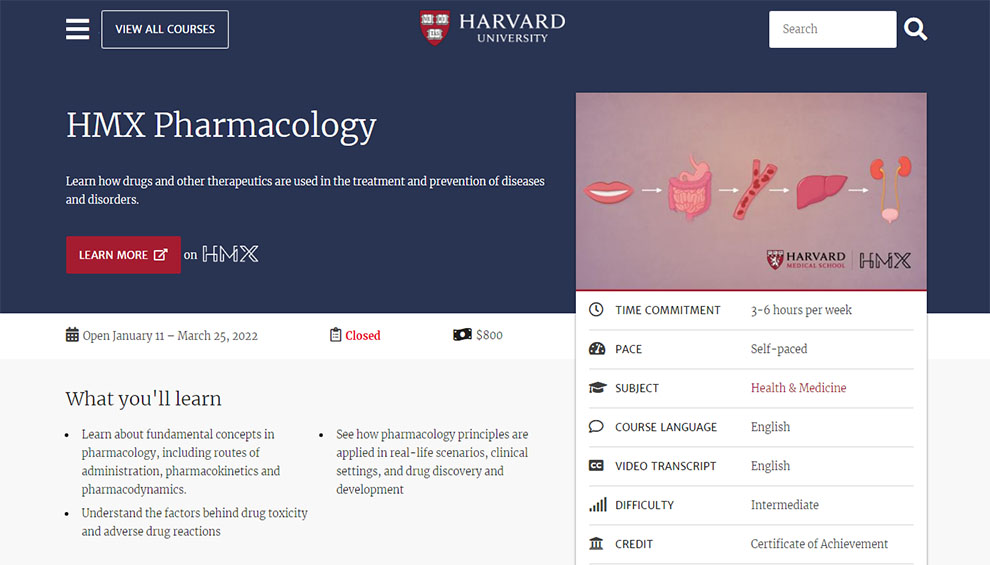
To treat the patients, you must have an understanding of the impact of drugs on the body. In this best online pharmacology course, you will become thorough with all the principles that define the impact of the drugs on the body.
You will also get an understanding of how this knowledge comes into play in a real-world setting. This is an online self paced pharmacology course. So, you can start and finish the course at your timeline.
| Rating | N/A |
| Duration | 3-6 hours per week |
| Certification | Yes |
| Instructor | Harvard Medical School faculties – Dr. Kate McDonnell-Dowling, Dr. James P. Rathmell, and Dr. David E. Golan.
|
| Paid/Free | Paid |
| Live/Recorded | Recorded |
| Level | Intermediate |
| Cons | It is quite expensive compared to the others on this list. |
Learning Outcomes
Some things that this best online pharmacology course will teach you are:
- The fundamental concepts in pharmacology, which include routes of pharmacokinetics, pharmacodynamics, and administration
- Knowledge of the factors behind adverse drug reactions and the drug toxicity
- Understanding how the pharmacology principles are applied in clinical settings, real-life settings, and drug development and discovery
Prerequisites, if any:
Seeking an answer to ‘the best intermediate-level pharmacology course near me?’ If yes, this is one of the top online pharmacology classes for you.
However, since it is an intermediatory class, you need some background in the field to pursue further. In addition, it is an English-language course. So, familiarity with the language will surely help.
5.NBDE Pharmacology Mnemonics Online Course – Part 1 – [Udemy]
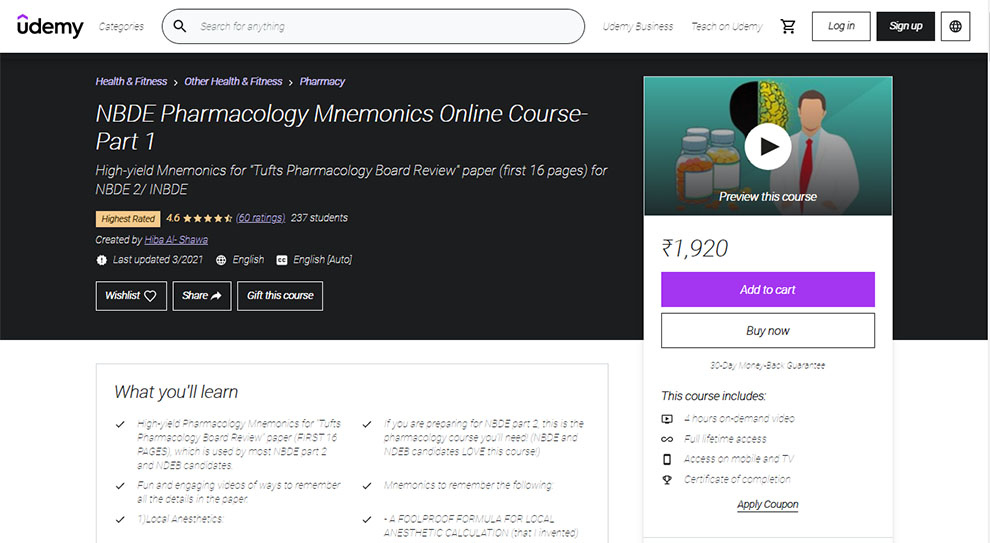
It is an introductory-level Part 1 of the three-part online pharmacology courses. The course covers mnemonics for basic pharmacology that you must know. Part 3 of this course is in video form available on Udemy.
The second part is available in PDF form on some other website. If you need the link, you can enquire the instructor during the course. Please bear in mind this course is based on the “Tufts Pharmacology Board Review” paper for NBDE.
If you are an NBDE student, you must be aware of this paper. So, in this online self paced pharmacology course, the instructor will follow the same precise curriculum and order of questions and notes.
| Rating | 4.6 |
| Duration | 4 hours |
| Certification | Pharmacology certificate online |
| Instructor | Hiba Al- Shawa |
| Paid/Free | Paid |
| Live/Recorded | Recorded |
| Return or Refund policy | 30-day refund policy |
| Cons | More content could be included to suit the price and make it more comprehensive. |
Learning Outcomes
There is an array of things to learn with this one of the top online pharmacology classes. Here is a quick list of each of these things.
- High-yield Pharmacology Mnemonics for “Tufts Pharmacology Board Review” paper used by most NBDE part 2 and NDEB candidates
- Course content for NBDE part 2 students
- Mnemonics to memorize the following:
A. Antibiotics
- Toxicities or Side effects of clindamycin, tetracyclines, penicillins, etc
- Interactions between antibiotics and other drugs
- Mechanism of action of various antibiotics
- Comparing different penicillins in areas of potency, allergenicity against different bugs and spectrums, administration, and drug of choice in certain conditions
B. Local Anaesthetics
- Mechanism of action of LAs
- Absorption of LA
- Duration of action of different Local anesthetics
- Toxic reactions to Las
- The formula for local anesthetic calculation
- Differentiating between amides from esters
C. Cardiovascular Drugs
- Mechanism of action of various agents
- Drugs used to treat different conditions
Prerequisites, if any:
You must possess a primary medical background to take these online pharmacology classes.
Is it the right course for you?
This is suitable for:
- Pharmacy students or anyone finding it hard to memorize pharmacology
- People from health science, medicine, and dentistry fields.
- NBDE part 2, INBDE, NDEB (AFK) students, and other Dental board candidates.
6. Online pharmacology course – [Straighter Liner]
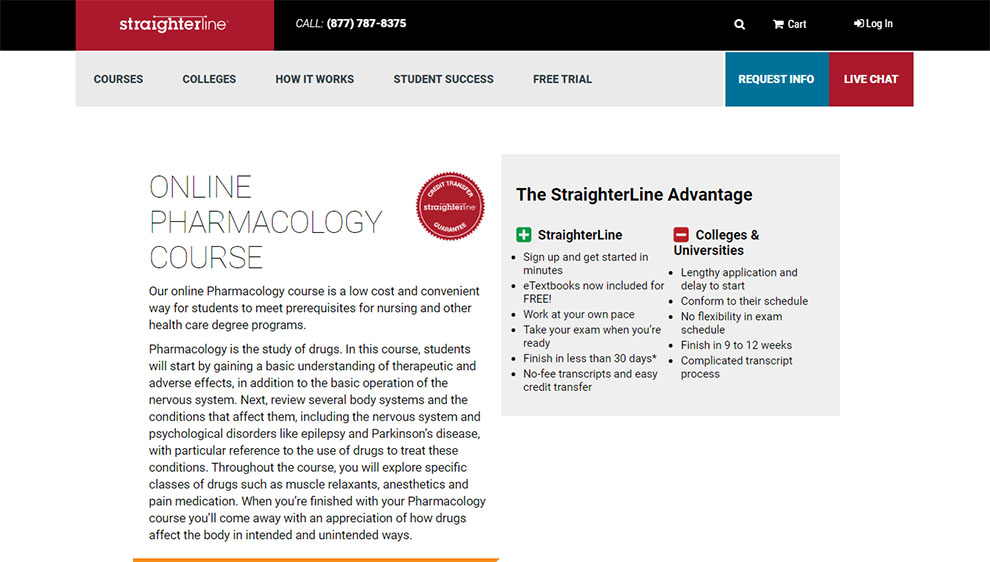
Do you need the best online pharmacology course that can help you earn some college credits? If yes, then this can be your go-to course. It is a 75-hour long course and will need a weekly commitment of 17-20 hours for you to efficiently complete in 30 days.
The good thing is these are self-paced online pharmacology classes. So, you can start and end at your timeline. In addition to the theoretical aspects, the course also has multiple practice questions. These can help you solidify your understanding of the concepts.
There is also a graded online exam whose contents have been sourced from McGraw Hill. For students seeking to earn some college credits, this exam holds importance.
| Rating | N/A |
| Duration | 75-hours |
| Certification | Yes |
| Instructor | Multiple |
| Paid/Free | Paid |
| Live/Recorded | Recorded |
| Cons | If you need to complete the course in one month’s membership fee, the effort requirement and time investment may feel overwhelming. |
There are two ways to pay for this course. You can pay a one-time fee, or shop for Straighter Line membership. This membership fee can give you access to other online courses, too, on the platform. When you pay for these pharmacology classes, you will also get a free eTextbook.
Learning Outcomes
If you are on the lookout for the ‘most comprehensive pharmacology course near me,’ then this can be a good pick. There are a bunch of things you will learn with this course. These include:
- Fundamentals of pharmacology.
- Terms associated with drugs
- Therapeutic and adverse effects of different drugs
- Knowledge of the major body systems, such as the reproductive system, cardiovascular system, gastrointestinal system, and nervous system with special emphasis on immune and endocrine systems
- Understanding of psychoactive medicines, anesthetics, muscle relaxants, and pain medication
- Learning of pediatric and geriatric pharmacology
Topics covered
There are several chapters included in this course. These are:
- Drug terminology and its effects and actions
- Drug dosage Calculations: Systems of measurements, ratios and proportions, solutions, and IV
- Understanding of pediatric & geriatric pharmacology
- Effects of drugs on the autonomic ganglia and the Sympathetic Nervous System
- Endocrine system and steroids
- Adverse effects of drugs and various drug interactions
- Parasympathetic stimulation
- Autonomic Nervous System functioning
- Learn about Nutrition, fluids, and diuretics
- Sedative hypnotic drugs
- Drugs for hypertension, congestive heart failure, allergies, respiratory diseases
- Antipsychotic and antianxiety drugs
- Antidepressants, general and local anesthetics
- Overview of anticoagulants and coagulants
- Gastrointestinal disorders and intestinal motility
- Viral, bacterial, and fungal pharmacology
- Parasitic infection and wound pharmacology
- Cancer and immune pharmacology
Prerequisites, if any:
This is a beginner-level course. So, as such, there are no prerequisites to take this course. In fact, this course can serve as a prerequisite for health care and nursing degree programs.
Is it the right course for you?
This is one of the best online pharmacology courses for medical students who wish to better their knowledge and understanding of the impact of drugs on the body.
Sign Up Here
7. Online Pharmacology Class – [Des Moines Area Community College]
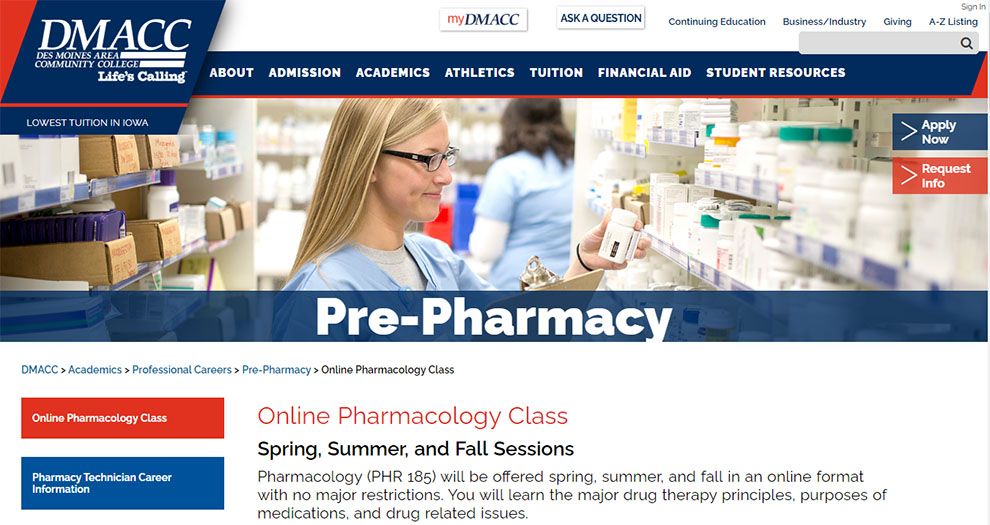
Pharmacology (PHR 185) online pharmacology classes will be offered in fall, summer, and spring without any restrictions.
| Rating | N/A |
| Duration | Spring, Summer, and Fall Sessions |
| Certification | Yes |
| Instructor | Multiple |
| Paid/Free | Paid |
| Live/Recorded | Live and recorded |
Learning Outcomes
In this online self-paced pharmacology course, you will learn about the purpose of medications, the key drug therapy principles, and the different drug-related issues. Further, you will also learn to administer, recommend, or prescribe the medications in your professional career.
Is it the right course for you?
This online pharmacology course is limited to only the first 25 students who enroll for this course. Therefore, this course will be beneficial for pre-nursing, nursing, pre-physician assistant, pre-med, pre-pharmacy, or other pre-health professional students.
Summer Syllabus
- Summer 2021(PDF)
- Summer 2021(Word Document)
Fall Syllabus
- Fall 2021(PDF)
- Fall 2021(Word Document)
Conclusion
If you often end up searching for ‘Are there any good pharmacology courses near me,’ we are positive that we’ve answered your question pretty well with our selection of top-rated online pharmacology courses.
We have tried to include all the details possible about these online pharmacology classes in this article. If you wish to know more about these online pharmacology courses, click on the link attached and read more details, such as the enrolment date, reviews received on the course, instructor info, and other necessary details.
You might also be interested in our other suggested medical courses. Check out the best immunology courses and pathophysiology courses according to experts.

